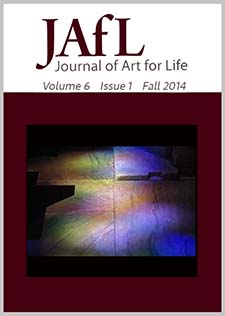Artistic Self-Perceptions: Sociocultural Learning in the Elementary School
Keywords:
self-efficacy, self-perception, mentoring, sociocultural learning, communities of practiceAbstract
This study considers the possible impact of children’s artistic self-perceptions This four-year study focused on afterschool visual arts instruction in an inner city school with third, fourth, and fifth grade students who were mentored weekly by college-age students on a one-on-one basis. Through the theoretical lens of social learning theory (Vygotsky, 1934/78; Bandura, 1977; Noddings, 1995), the program’s impact on children’s sense of agency was analyzed. The researcher enlisted the use of a measurement survey each spring semester over the course of the study. Utilizing the dependent means t-test, it was determined that students showed important gains (significant at the .05 level) on a self-perception scale. The significance is attributed largely to the children’s active engagement in art, to the social organization of the art classroom, and to collaborative instruction. These sociocultural dynamics were cultivated, developed, and reinforced by the collaboration between the college-aged mentor and the elementary-aged student.Downloads
Issue
Section
Articles
License
Authors who publish with this journal agree to the following terms:- Authors retain copyright and grant the journal right of first publication with the work simultaneously licensed under a Creative Commons Attribution License that allows others to share the work with an acknowledgement of the work's authorship and initial publication in this journal.
- Authors are able to enter into separate, additional contractual arrangements for the non-exclusive distribution of the journal's published version of the work (e.g., post it to an institutional repository or publish it in a book), with an acknowledgement of its initial publication in this journal.
- Authors are permitted and encouraged to post their work online (e.g., in institutional repositories or on their website) prior to and during the submission process, as it can lead to productive exchanges, as well as earlier and greater citation of published work (See The Effect of Open Access).


